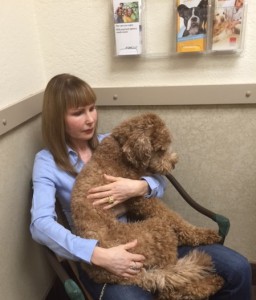How Long Should You Have to Wait to See a Doctor?
How long should you have to wait to see a doctor? Why not just call a doctor?
The patient in the photo was able to get a same-day appointment within 15 minutes of the request and was seen within 10 minutes after arriving. But that is an exception in the United States. A recent article in the American Journal of Managed Care estimated the average physician visit takes two hours (121 minutes). That includes travel time (37 minutes), waiting time (about an hour) and treatment time (10 to 20 minutes). Of course, that’s once you get an appointment.
A 2014 Merritt-Hawkins survey of major cities found the wait time for a new patient to secure an office visit with a family physician took an average of 20 days (i.e. about three weeks). This ranged from a high of 66 days in Boston but only 5 days in Dallas. Wait times in Dallas ranged from 1 day to 10 days. I expect this would be very different in rural areas.
Why not just call a doctor? If you cannot get your doctor on the phone, why not contact another doctor by phone? A recent article in D Magazine looked at TelaDoc, a Dallas-based provider of telemedicine. The reporter, Matt Goodman, relayed an anecdote of the time he woke up with a sinus infection. Luckily Goodman’s sinus infection occurred on a weekday, when doctors’ offices are open. Goodman was able to see his primary care physician that day only because of a 3:00pm cancellation. As it turns out, Goodman waited about seven hours for a nine minute consultation with his doctor. Had he called TelaDoc, a board certified physician would have returned his call in under an hour – 30 to 40 minutes in most cases. He could have been on his way to the drugstore for a prescription within an hour or so. Goodman’s symptoms where typical of TelaDoc consultations. About half of their consults are for sinusitis (19 percent), upper respiratory infection (12 percent), pharyngitis (8 percent), bronchitis (7) and urinary tract infection (5 percent).
TelaDoc is the biggest telemedicine provider in the country, with revenue of about $77 million in 2015. I wrote about them nearly a decade years ago, including these policy reports here and here.
In the future, Texas patients who lack timely access to their regular physician may be stuck. The Texas Medical Board is trying to shut down telemedicine in Texas. (More on the legal case here; NCPA wrote about why it’s a bad idea here.)
When you were a child your mother may have told you not to talk to strangers. Texas’ Medical Board has taken this to heart and assumes it applies to doctors too. The Medical Board proposed new regulations to require patients to have an established relationship with a doctor before talking to that doctor on the phone. This would protect established brick & mortar physician practices from completion from TelaDoc or other telemedicine providers. Regulations also require an in-person follow up physician visit after a telemedicine encounter. Taken together, these two regulations seem more about padding local providers’ wallets more than protecting patient health. The feds seem to agree. The U.S. Justice Department and Federal Trade Commission are both backing TelaDoc. A federal judge granted a preliminary injunction halting the telemedicine rules pending litigation.



Telemedicine has a big role to play in the future of medicine but you need to find better examples. Most cases of sinusitis SHOULDN’T get a prescription (presumably for antibiotics).
My wife used TelaDoc for the 1st time and she loved it. She said that next time it would be faster because now they have her info.
I enroll consumers with TelaDoc and there is no charge for using it. That’s cheaper than an office visit charge.
I have access to TelaDoc through my Aenta plan. Prior to that I had to as a stand-alone employee benefit. I’ve never had a chance to use it, but it seems like a great way to talk to a doctor.
My wife was just diagnosed with Breast Cancer today and her doctors office referred her to a surgeon who can not see her tell Dec 5. I called a friend of mine in the medical community and now he is seeing her next week. Sometimes it’s just who you know.
Teledoc would not have helped her today but I think it can be useful for trivial medical conditions. However trivial medical conditions do not need to be insured. They can be personally financed. Breast Cancer is the type of medical condition insurance is for.
Sorry to hear this news Lee. We will pray for your wife’s rapid recovery.
Lee I hope everything turns out all right. The odds are in your favor! The vast majority of breast cancers are discovered before they have spread. Those have a 99% 5-year survival rate. The survival rate only drops only slightly for cancer that has spread to surrounding tissues.
Thanks guys, she’s a tuff old girl. I’m confident she will overcome. She does have excellent insurance and price is not an object. My first question to the Doctor was who would you take your wife to. That’s where we are,going. wil be filling the CI claim next week so she has funds to pay whatever needs to be paid. Family deductible is already met this year so let’s get this treatment started.
I think TelaDoc is a great thing for people with minor one-time ailments, but somewhere along the line, there needs to be a history established in one centralized location. An established history with a physician that knows your medical background is crucial to knowing how to treat both current and future complaints. I hate waiting too, but I think TelaDoc should be the exception in your medical care, not the norm.
http://www.byrdadatto.com/